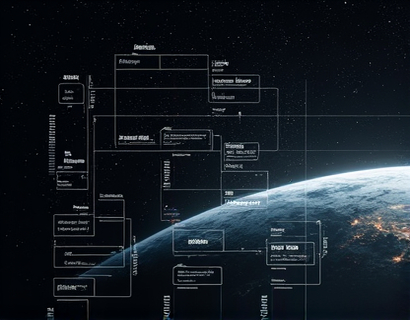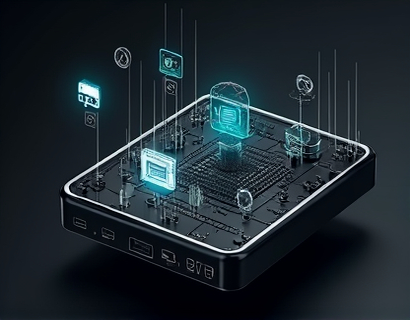Unlocking Growth in the Crypto and AI Ecosystem: A Strategic Guide to Leveraging Digital Transformation
The intersection of cryptocurrency and artificial intelligence (AI) represents one of the most exciting frontiers in the digital economy. As businesses and tech enthusiasts seek to enhance their online presence and drive growth, understanding how to integrate blockchain and AI can provide a competitive edge. This guide explores strategic insights for leveraging digital transformation to maximize engagement and achieve business success in the rapidly evolving crypto and tech landscape.
Digital transformation is no longer a choice but a necessity for businesses aiming to stay relevant. The crypto and AI ecosystems offer powerful tools that, when combined, can revolutionize how companies operate, engage with customers, and innovate. This article delves into the synergies between these two domains, providing actionable strategies for businesses looking to harness their potential.
Understanding the Crypto and AI Ecosystem
The crypto ecosystem encompasses cryptocurrencies, blockchain technology, and decentralized applications (dApps). Blockchain, the underlying technology, provides a secure, transparent, and immutable ledger for transactions. This technology has far-reaching implications beyond finance, including supply chain management, identity verification, and smart contracts.
AI, on the other hand, involves the simulation of human intelligence processes by machines, particularly computer systems. These processes include learning (the acquisition of information and rules for using it), reasoning (using rules to reach approximate or definite conclusions), and self-correction. When combined, blockchain and AI can create robust, secure, and intelligent systems that enhance trust and efficiency.
Leveraging Blockchain for Enhanced Security and Transparency
One of the primary advantages of blockchain technology is its ability to ensure security and transparency. In the crypto and AI ecosystem, this can be leveraged to build trust among users and stakeholders. For instance, in supply chain management, blockchain can track the origin and journey of products, ensuring authenticity and reducing fraud.
For businesses, implementing blockchain can mean fewer disputes, reduced costs, and increased customer trust. In the context of AI, blockchain can secure data integrity, ensuring that the data used to train AI models is genuine and unaltered. This is crucial for the reliability and accuracy of AI-driven decisions.
AI-Driven Insights for Data Analysis and Decision Making
AI's strength lies in its ability to process and analyze vast amounts of data quickly and accurately. In the crypto space, this can be used to predict market trends, identify investment opportunities, and manage risks. For businesses, AI can provide deep insights into customer behavior, preferences, and market dynamics, enabling more informed decision-making.
By integrating AI with blockchain, companies can gain a comprehensive view of their operations and market environment. For example, AI can analyze transaction data on a blockchain to identify patterns and anomalies, helping businesses optimize their processes and enhance security measures.
Enhancing Customer Engagement through Personalization
Personalization is key to customer engagement in the digital age. AI algorithms can analyze user data to create tailored experiences, recommendations, and interactions. When combined with the transparency and security of blockchain, this can lead to highly personalized and trustworthy services.
For instance, in the realm of digital content and media, AI can curate content based on user preferences, while blockchain ensures that creators are fairly compensated for their work. This not only enhances user experience but also supports a sustainable ecosystem for content creators.
Streamlining Operations with Smart Contracts
Smart contracts, self-executing contracts with the terms directly written into code, can significantly streamline business operations. In the crypto and AI ecosystem, smart contracts can automate various processes, from payments to data sharing, reducing the need for intermediaries and lowering transaction costs.
For example, in the supply chain, smart contracts can automate payments upon delivery verification, ensuring timely and efficient transactions. In the context of AI, smart contracts can manage data access and usage rights, ensuring that data providers are compensated fairly and that data integrity is maintained.
Building Decentralized Applications (dApps)
Decentralized applications (dApps) are a natural fit for the crypto and AI ecosystem. These applications run on a blockchain network, leveraging AI to provide intelligent and autonomous functionalities. dApps can offer users more control over their data and interactions, reducing reliance on centralized platforms.
For businesses, developing dApps can open new markets and create innovative services. For instance, a decentralized social media platform powered by AI can offer users greater privacy and control over their data, while using AI to curate and personalize content.
Challenges and Considerations
While the potential benefits are significant, integrating blockchain and AI also comes with challenges. Technical complexity is a major hurdle, requiring specialized knowledge and expertise. Additionally, regulatory uncertainties and the volatility of cryptocurrencies can pose risks.
To navigate these challenges, businesses should invest in building a skilled team or partnering with experts in both blockchain and AI. Staying informed about regulatory developments and adopting a cautious approach to cryptocurrency investments can also mitigate risks.
Strategic Implementation Steps
For businesses looking to leverage the crypto and AI ecosystem, here are some strategic implementation steps:
- Conduct a thorough assessment of your current operations and identify areas where blockchain and AI can add value.
- Build or partner with a team of experts in blockchain development, AI, and data science.
- Start with pilot projects to test the integration of blockchain and AI in specific processes or services.
- Focus on enhancing customer engagement through personalized and secure experiences.
- Monitor regulatory developments and ensure compliance with all relevant laws and standards.
- Continuously evaluate and optimize your blockchain and AI solutions based on performance and user feedback.
By following these steps and maintaining a forward-looking approach, businesses can unlock new opportunities and drive growth in the crypto and AI ecosystem.
Conclusion
The convergence of cryptocurrency and AI represents a transformative force in the digital economy. By embracing these technologies, businesses can enhance security, gain valuable insights, personalize customer experiences, and streamline operations. While challenges exist, the potential rewards make the journey well worth the effort. As the crypto and AI landscapes continue to evolve, those who adapt and innovate will be best positioned for success.










































